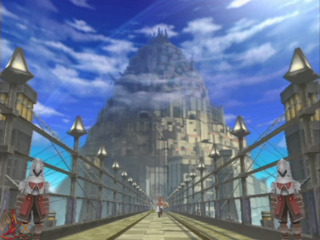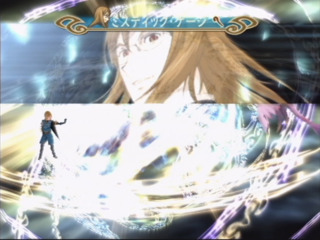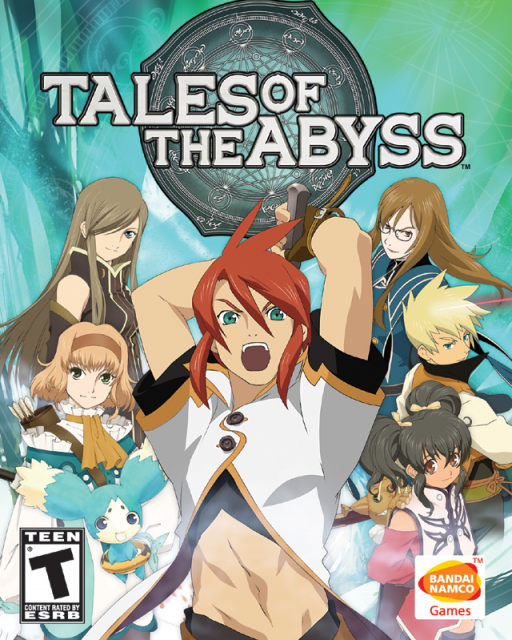Tales of the Abyss: Quality Belying the Blemishes
Qualifying what Tales of the Abyss is and isn't is a bit of a difficult task. When I started playing it, it was difficult to not make comparisons to other games left and right, especially to Abyss' older sibling Symphonia, the only other Tales game I had completed. "Oh, Symphonia had the more simplistic story," I'd go, or "These characters don't look quite as flashy." Perhaps those comparisons are inevitable for me, especially since, like many GameCube owners, I played and loved Symphonia in its heyday. That being said, it's to Abyss' credit that it ultimately manages to stand tall and be a great game on its own. The game isn't without its flaws, but Abyss' pluses certainly outweigh its minuses in the end and as long as you can come to terms with that fact, it's definitely a worthwhile purchase.

Complementing the story is Abyss' combat, a system that, while familiar, continues to be really fun and thankfully contrasts the standards of other JRPGs. Like other installments before it, Abyss employs Bandai Namco's proprietary real-time fighting format, in which combatants are placed on somewhat separate planes on the same battlefield and made to fight it out. The attacks for your character are mapped the circle button in tandem with the left control stick; the equipped attacks can be switched both mid-battle and outside combat. The AI then handles the other three characters working with you, with the game giving you a pretty extensive set of variables to modify so that they act just as you please. Direct commands can, however, be given, and you can also switch which character you're playing as on the fly. There are some other things to take into consideration as well, but as a whole, in practice, Abyss' fighting system is a really fun and versatile one that lets you experiment extensively until you find a happy medium in settings and attacks that fits your style. While it all may sound intimidating in writing, it's actually far more intuitive and simplistic in reality, a trait that greatly helps keep the battles entertaining from the beginning of the game to its conclusion.
Naturally, though, being an RPG, Abyss' combat is contextualized by the plot. Those going into Abyss expecting to experience a good story will probably have that expectation fulfilled, but not without a few caveats along the way. Its biggest problem is an accessibility one, specifically that the game doesn't always do the best job cluing you in on the underlying nuances of major plot events. Certainly, the main gist to take out of everything is understandable; it's when the characters start explaining the hows and whys of things that confusion sets in. The fault lies mostly in the game's brands of science and the magic derived from it. Abyss, being the developed and fleshed out world that it is, has a lot of new terminology it uses very liberally. Luke's ignorance does set up some times for explanations of those concepts, but ultimately they're half-baked, leaving you to do the real understanding as you go along. Thankfully, it's only especially probelmatic in the opening acts and it never gets too bogged down in the vocabulary that you become lost and don't know where to go next and what to do. As the game goes on, the immersion in the world does help make things easier to follow, even if it still isn't consisten 100 percent of the time.

In addition, like previous Tales games, Abyss also has skits, which are optional conversations you can watch in which the characters discuss everything from the current events to silly things that strike their fancy. While you're under no obligation to actually watch them, they do a lot to flesh out the characters in ways that might not otherwise be possible to fit into the overarching story. You get to know a lot of individual quirks and backstories that quietly, but assuredly make them feel well-rounded. Skits are therefore actually quite worthwhile. It doesn't take long before initiating the skits becomes a habit because of that.
On a thematic level, the game is also able to resonate well. The larger topics that Abyss tackles might not be overly original on their own, but their presentation ensures that their presence is nonetheless welcome. There's plenty to dissect from the story, too; among many other things, there are debates about the infallibility of religious texts, the impact of trying to manipulate the environment for seemingly the better, and what it means to have a self-identity. None of it is really meant to provide an epiphany, but it all accents the story and enriches it in such a way that the story is, in conjunction with its characterizations, a relateable one, even if some parts of the nitty gritty are confusing.
Technologically, Abyss is a competent game on the PlayStation 2. The graphics are colorful and lively, but stylized in such a way that the console isn't being pushed to its breaking point. That's ultimately for the best, as it means that things like fighting will overall stay smooth and stable. However, there are still quirks to be found in the graphics engine. While traveling on foot in the overworld, the frame rate can get pretty erratic and, at times, takes a significant dip even when there isn't that much on the screen at all. Thankfully, that goes away if you enter a city or initiate a battle, but it's still irksome and odd to experience, considering the frame rate drop doesn't typically happen in deliberately intensive areas such as battles. On top of that, Abyss has quite a few loading times with which to contend. It's to be somewhat expected, what with it being a PlayStation 2 title, and they're typically short, but they still show up a bit too often to be comfortable. It can be a bit jarring when the game will sometimes load a scene and start animating the characters, for example, only to have to wait up for dialog for a few seconds.

When I started playing Tales of the Abyss, I wasn't entirely sure what to make of it. It had been a long time since I had played Symphonia and I was unsure whether that unique sort of RPG style would still appeal to me. But given enough time, Tales of the Abyss shines brightly and a great time is therefore to be had. There are indeed issues that are worth noting about the game. The story isn't the most accessible one from the outset and the graphics and load times could have probably been improved. But if you come for exciting combat and a story that ultimately proves to be gripping, then you've found the right game. Tales of the Abyss is a satisfying experience and while it may not be perfect, do not, by any means, let that stop you from picking up a copy. It's not a masterpiece, but at the end of the day, it's still a great game and that's all that really matters.
